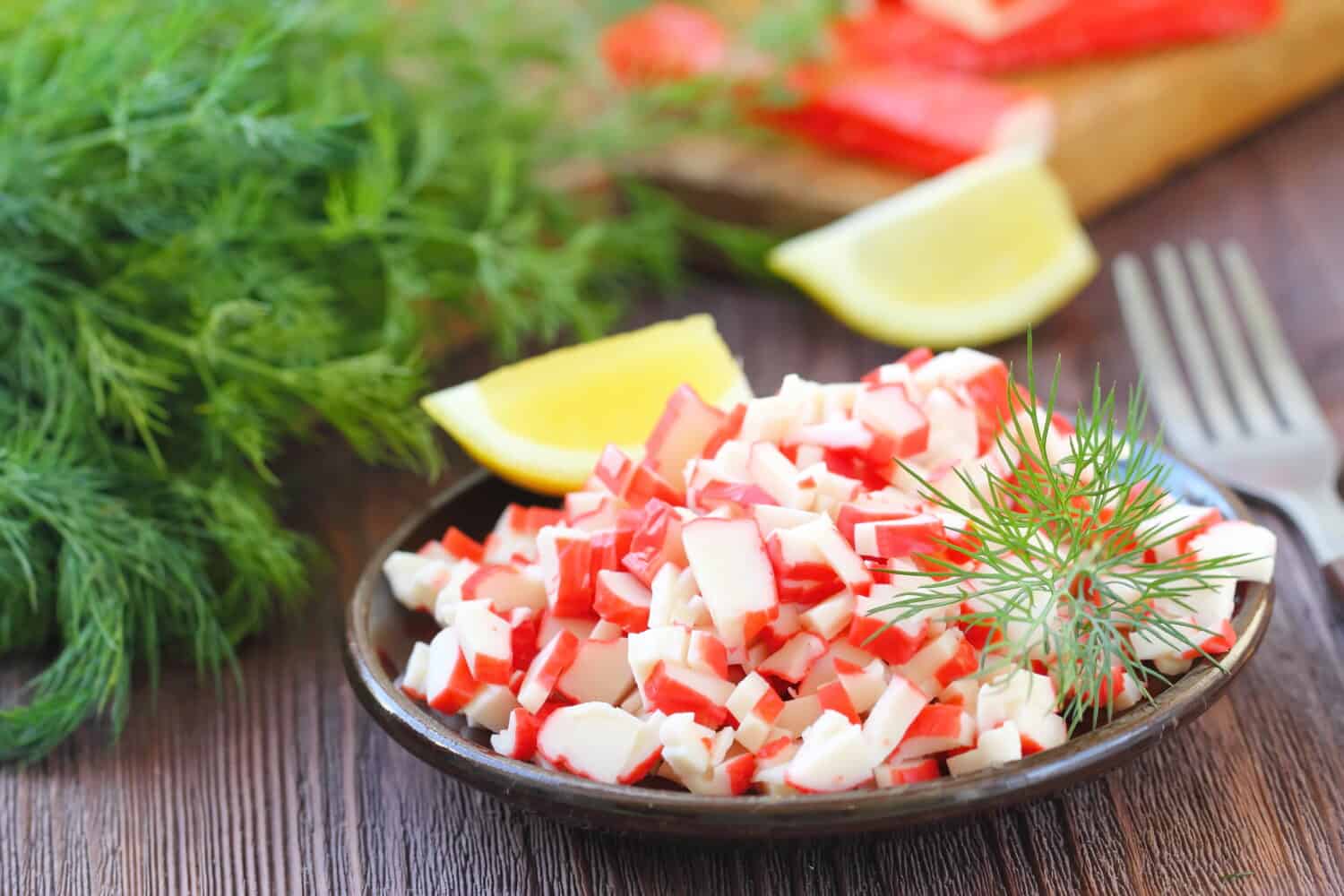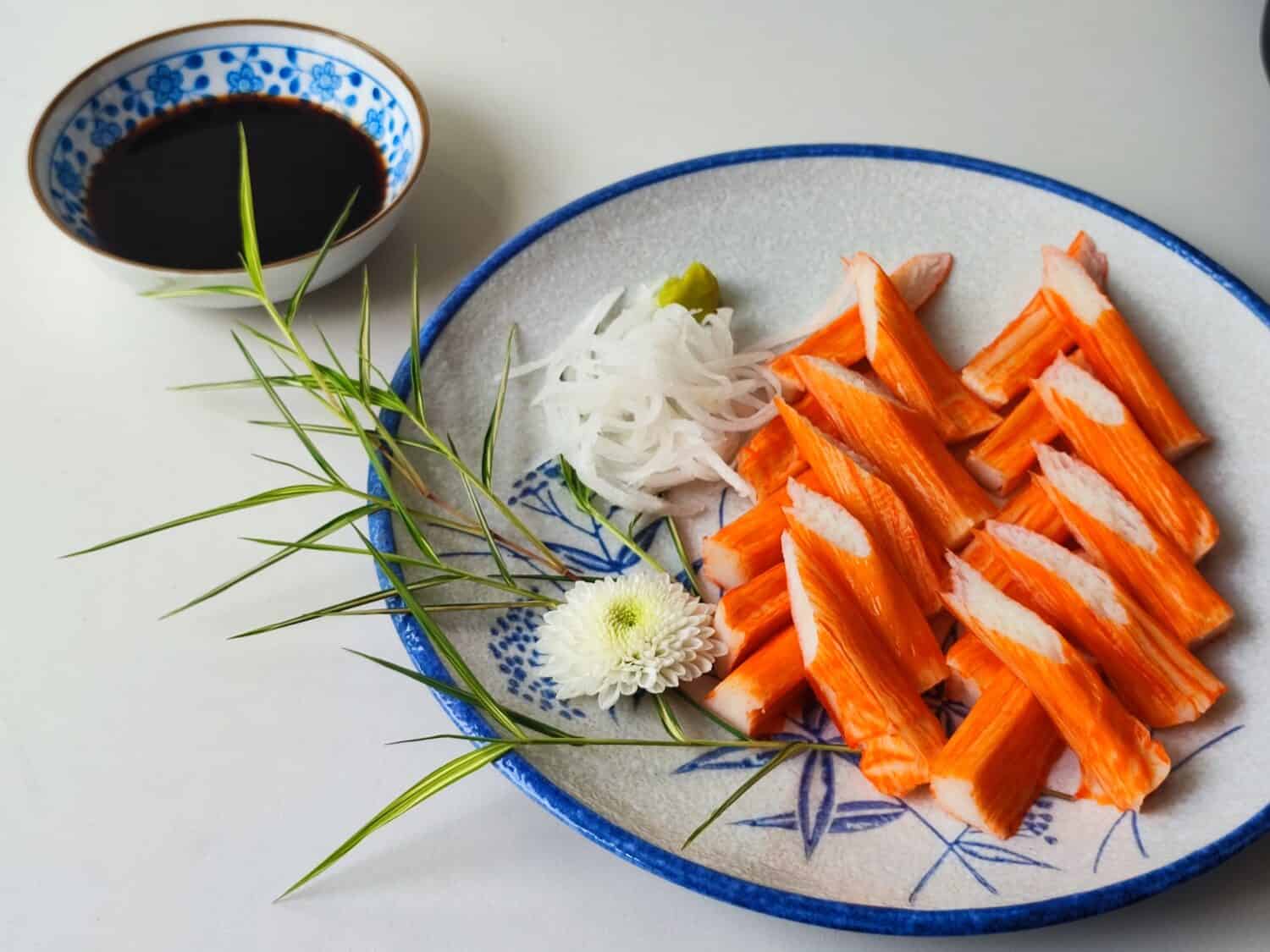Imitation crab is an option many people use because of how well it imitates real crab and its cost. It is usually a third of the cost of real crab meat. You'll often find it used in salads, sandwiches, spreads, and sushi. But if it's not real, is imitation crab actually healthy for you? The answer is no, it is not a healthy choice to be using on a regular basis. Let's take a look at what imitation crab is, its potential health benefits, and health risks.
What Is Imitation Crab?
Imitation crab is a meat made to replicate crab. It's made of fish meat that is minced into a paste and blended with egg white, sugar, salt, starch, and other additives to make it look, taste, and feel like real crab meat. Although imitation crab is made from real seafood, it doesn't contain any crab meat. The only real crab in imitation crab is crab extract, which is added to get the right flavor.
The fish commonly used to make imitation crab is pollock. Pollock is also used to make breaded fish products like fish sticks. Pollock is a part of the cod family and has a mild color and flavor. The fish paste made of pollock used to make imitation crab is called surimi.

Imitation crab was invented in Japan in 1974.
©New Africa/Shutterstock.com
Nutritional Value
Because imitation crab is not real crab, it offers significantly less nutrients and vitamins than real crab. If we look at imitation crab vs. Alaskan king crab, here are some of their nutritional differences. In a three-ounce serving, imitation crab has around 10 grams of protein less than real crab. It's also significantly higher in carbs having 12.8 grams of carbs, whereas real crab has 0 carbs.
Real crab offers a high amount of the minerals and vitamins we need on a daily basis, imitation crab does not. Imitation crab only offers 21% of our daily value needed of vitamin B, while real crab is very high in vitamin B and offers 408%. Real crab has 111% of our daily value needed of copper, and imitation crab has 3%. Real crab has 62% of our daily value needed of selenium, whereas imitation crab has 35%. Imitation crab has only 3% of our daily value needed for zinc, and real crab has 55%.
Imitation crab is much lower in nutrients because pollock does not contain these nutrients in high amounts. But, there are a few things that imitation crab is better for. Imitation crab is significantly lower in sodium, with 450 mg, whereas real crab has 910 mg. It is also lower in fat, with 0.4 grams of fat. Real crab has 1.3 grams of fat.
Health Benefits
Besides offering a significantly lower amount of sodium than real crab, imitation crab is not known to have any health benefits. If this is the case, why is it commonly used by so many? Because of its availability and affordability, imitation crab has become a popular ingredient.

Imitation crab gained its popularity due to its affordable price, making “crab” available for everyone to enjoy.
©Gamzova Olga/Shutterstock.com
Health Risks
Because imitation crab is a highly processed meat, it has some health risks. It also has other additives that can be harmful. Commonly used additives in imitation crab include red coloring, gums, glutamate, and preservatives.
Xantham gum which is used as a thickener or stabilizer, can cause some issues with digestion. Studies have shown that large amounts of xantham gum can cause damage to gut bacteria, increase bowel movements, and soften stool.
Sodium Benzoate is a preservative used in imitation crab. This preservative is debated among many as to whether it is safe or not. It has been approved by the FDA to be safe in small amounts. You'll often find sodium benzoate in sodas and other foods that have a long shelf life. Because the FDA claims it is safe in small concentrations, some believe it doesn't cause any harm, while others believe it's linked to cancer and other health issues. There are studies that show sodium benzoate can cause inflammation, ADHD, reduced appetite control, oxidative stress, and allergic reactions.
Conclusion
Imitation crab is popular because it is an affordable product that very accurately replicates real crab. It is often used in sushi, salads, spreads, sandwiches, and other dishes. It is also a convenient option because it doesn't require any preparation, is simple to use, and is versatile. However, imitation crab is a highly processed food which ultimately leads to some negative health risks. This does not mean you cannot consume imitation crab, it is just best to limit your intake and not use it on a regular basis.
The image featured at the top of this post is ©Plapakpao/Shutterstock.com
